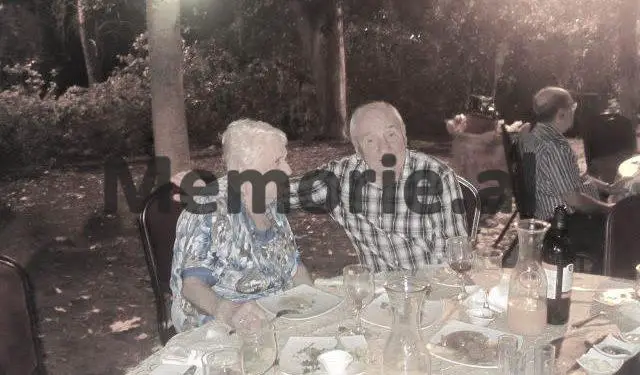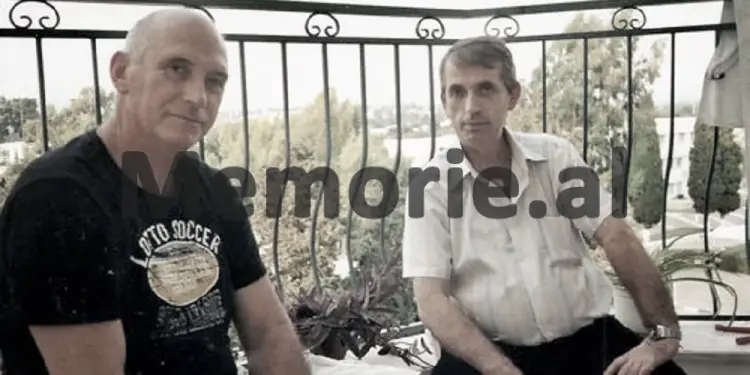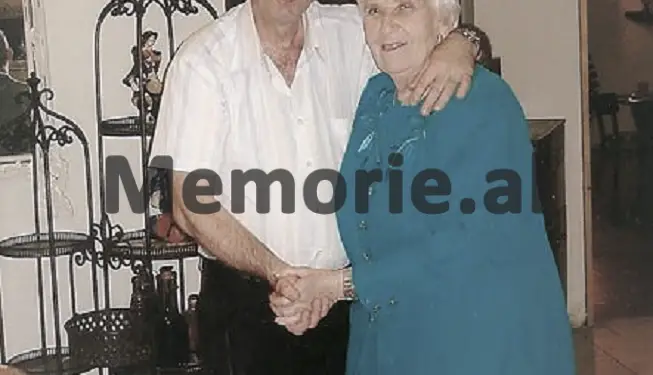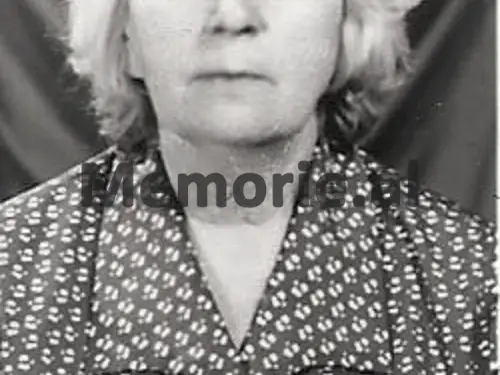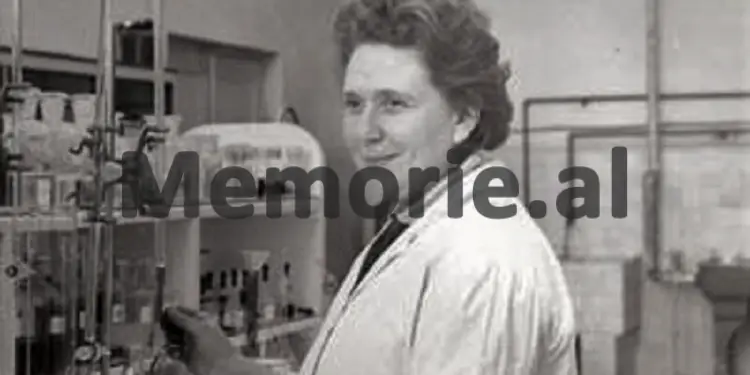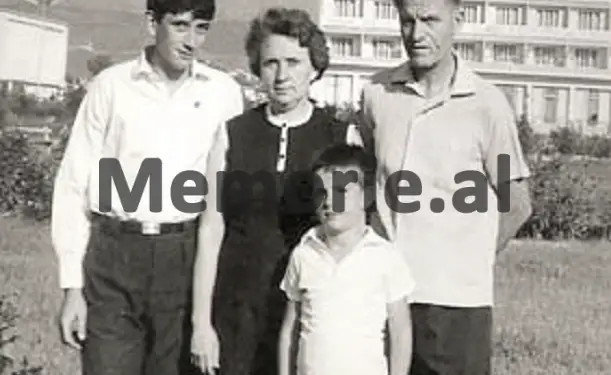Taisa Batkina Pisha
Part nineteen
Memorie.al/ publishes the unknown story of the Russian Taisa Batkina (Pine), originally from Tula, Russia, the third child of a very poor rural family, who was left an orphan at a very young age, after her father lost her life while working in one of the coal galleries on the outskirts of Tula, where he worked as a miner (shortly after escaping arrest, accused of “supporting the enemies of the people”) and she grew up with difficulty great economic, as their city continued to be under the bombardment of German forces, which had reached as far as near Kursk. Taisa graduated from the Faculty of Chemistry, near the ‘Lomonosov’ University of Moscow, where she met and married the Albanian student, Gaqo Pisha, originally from the city of Korça, who at that time was studying at the Faculty of Philosophy in Moscow and both together in 1957, they returned to Albania, together with their newborn son, Sasha, and began life in the city of Tirana, where Taisa was appointed as a professor of Chemistry at the State University of Tirana, while Gaqo, in the chair of Marxism- where they worked until 1976, when the State Security arrested Taisa Batkina on fabricated charges, accusing her of being a “Soviet KGB agent” and sentencing her to 16 years in political prison, which she suffered in the “Women’s Prison” in the city “Stalin”, from where she was released in 1986, while her husband, Gaqo Pisha, had died in 1983, from a serious illness. The tragic story of Taisa Batkina (Pine), in the inhuman camps and prisons of Enver Hoxha’s communist regime, where she spent a decade of her life, along with many compatriots from the former Soviet Union, or other Eastern European countries, comes through her memories, published in a book entitled “We hoped and survived”, memories which, her son, Aleksandër Pisha, kindly offered her for publication, in Memorie.al
We hoped and survived
I dedicate it to the bright memory of my husband, GAQO PISHA
This is a memoir. In it I want to tell about my life and that of my friends, Soviet women, who tried prison for several years just because they got the courage and got married and linked their fate with that of Albanian students. The prison was part of the great GULAG in the small Balkan country, Albania, where for many years the bloody communist regime of Enver Hoxha ruled, who was a loyal student of Stalin and a follower of his cause.
Through this book I would like everyone to learn about the inhuman trials we experienced and the horrible years we spent in Albanian prisons, just because… we fell in love! And let no one ever forget what totalitarianism, despotism is and what the consequences of this system are.
Continued from the previous issue
The shooting of Sokol, the son of Admiral Teme Sejko
Sokol was accompanied by friends who organized evenings, walks. Once in the field not far from Kombinati, where they worked, organized an evening, lit a fire and started roasting meat. Suddenly a police car arrived; all members of the evening were arrested. Most were released, and with a few remaining, they formed a “group”, which accused them of diversion, of attempting to burn the Kombinat. At the head of the group was Sokol. They decided to judge them openly, to conduct an indicative process. But the process turned against its organizers. Sokoli showed himself during the process a true hero, stood bravely and independently. He did not accept any of the accusations leveled against him, and at the end he delivered an unmasking speech, in which he told the whole truth about his father, about the persecutions, which were not removed from his family and other people, which they had no guilt. “I do not want to live in the country where Enver Hoxha’s regime rules!”I cannot and do not want to live with the mark of the son of the enemy of the people, or of the enemy”, – said Sokoli. His speech had the effect of detonating a bomb. This process in Berat was long remembered and whispered. Sokol was sentenced to the most severe measure: shooting. The authorities wanted Sokoli to be broken, to admit guilt, to pray for mercy; wanted to convince people that the process was not fabricated, that during it real enemies were tried, who had organized the diversion. Representatives of the Security organs, but also his relatives, tried to persuade Sokol to write a prayer for the pardon of life, to request the appeal of the case, but he remained inflexible, preferring death instead of a difficult life in prison. He was shot.
The tragic suicide of Sokol Sejko’s mother
Soon the police car stopped again in front of the admiral’s family home. They came to arrest the eldest son. The mother, in the height of despair, when she saw that the second son was also being taken, jumped from the balcony of the fourth floor, fell on the concrete road and died instantly. How the elder parents and the Angel experienced this horror, I do not know. There is no word to describe this evil. After several years in prison, I saw a petite, emaciated, black-clad old woman walking on her way to camp. I could not believe that it was the mother of the Angel, who came to meet her daughter-in-law. I remembered him tall, with a straight, beautiful body. But grief had broken him. She lost her daughter, grandson, husband, who could not stand the menace. The other nephew was in jail, sentenced to 10 years. Life went on and others brought with it other bad’s. In 1975 Ina was arrested. The issue of oil workers was rampant across the country at the time. There were oil reserves in Albania, discovered in the 1930s by the Italians. The extraction of oil continued even after the liberation. Most oil specialists were trained in the Soviet Union and Romania. Among them were many smart, capable, good specialist boys. I do not know details about the state of affairs in the oil industry in Albania, but I only know that, after the severance of relations with the USSR and other socialist countries, the Albanian leadership chanted the slogan: “We rely only on our own forces!”. But it was clear that these forces were not enough.
The equipment was becoming obsolete, the drilling was not yielding results, the oil wells were burning for years and the Albanians could not extinguish them with their own forces, but they also did not accept help from foreigners. Less oil was extracted every day. But the “big man, practitioner and theorist”, very quickly and very simply devised how to justify the situation in the oil industry: diversion and sabotage…! Now the enemies had to be found, who carried out the sabotage. And they found them there very quickly. Many engineers who had studied abroad were arrested. Some had Soviet women. (It did not matter that many of these women had long since returned to the Soviet Union; no one had any contact with them). Among those arrested were two of my friends, Ina and Lena. I do not know the details of this matter, no doubt fabricated. I only know that the group was accused of sabotage. Two the most talented himself were shot, the others received long prison terms. Ina and Lena had a long and arduous investigation. They wanted to confuse them with the oil issue; they wanted to prove that through them, the connection with other Soviet women, who had fled Albania 15 years ago, was ensured, to prove that the sabotage in the oil industry was led by Moscow. I do not know exactly how the oil issue was planned, but I know that they did it without Ina and without Lena. But as they say to the word, there must be enough man, that the matter is found. They accused them of agitation and propaganda, they were given 8 years.
The arrest of Ina and the family that did not abandon her
Ina’s agitation and propaganda were the anecdotes she told so beautifully. One of the main listeners of her anecdotes at work, but who also liked to tell anecdotes, as it was later learned, immediately went and reported to the relevant instances for each anecdote or story heard, giving them the right shades hostile. When Ina was arrested, the Angel told his daughters (the eldest was 18 at the time, the youngest, 15): “We have two options: we can deny the mother, not go to see her, not help her. Mom will feel very bad, it will be very difficult, and we will feel better. And the other way: we do not leave mom alone in this misfortune, we will share with her every evil “. The girls, without thinking at all, chose the second way. Ina was helped from home throughout her years in prison. The three of them always came, loaded, doing 15-20 km on foot. This gave Ina the strength to endure everything. Their arrival helped us too. The day they had to come, we in the morning walked around the yard, looking through the wires the way and waiting for them to appear. We rejoiced that, even from a distance, we could distinguish familiar faces. At that time, the Angel and the girls had a very difficult time. The atmosphere in the country was such that everyone immediately turned their backs on people who were considered enemies. Neighbors avoided them; friends did not greet them on the street. Particularly severe were those who lived in small towns where everyone knew each other.
The angel was immediately assigned to a completely insignificant job. Mariana, the beautiful girl, who finished high school brilliantly, could not study further, was not allowed. Jobs for her were found only in the brick factory, where she glued mud with her feet and pushed heavy hand carts. The little one was forced to go to night school because in her class, even her closest friends and girlfriends were afraid to sit on a bench with her and she stayed alone in class and on vacation during all school hours. . They always tried to stop them from adjusting to life. A very good, loving, honest, hardworking boy fell in love with the elder…! How the two young men took off until they got married! The boy was called to the neighborhood, to the party committee or elsewhere, asked not to associate with Marjana anymore. The parents swore that they would curse the son if he married that girl. They did their best to stop the young people, hide the documents, and even brought the work to the point where, when they went to the civil registry to celebrate, they found a banal reason and did not register it. With great difficulty they managed to register the marriage in another city. They now have a very good family and two sons. Behold, this was the fate of one of my friends. Ina was released from prison with the amnesty of 1982. When she was given the opportunity to flee Albania, they all went to the Soviet Union. Now live in beautiful Moscow.
Lena
I wrote something about Lena, when I wrote about Ina; I mentioned the investigation and the lawsuit against her. Lena and her husband were oil specialists, the chemist, and the economist. They worked at the Oil Refinery in a small town, raising two children. Lena was a good mother, housewife and exemplary worker. Normal life collapsed when her husband was arrested, shortly after Lena herself. The boys were left alone. Fortunately, my grandfather took them. All these years they lived and worked with him. Our children were assigned to the most difficult jobs: mining, construction, agriculture…! They were not given the right to study in high schools. Lena’s sons did not abandon their parents in a bad way, they constantly came to meetings, and they helped them. Accused, as I mentioned above, of agitation and propaganda. Lena spent a lot of time in prison, working as in the field, experienced constant hunger, tried to survive and. Survived. After staying for 7 years, she was released in 1982. The family reunited. Now they live normally in Albania.
Italian “spies”!
There were women in the camp who had been accused of espionage in the service of Italy. The main Italian “spy” was Maria, a charming woman, calm, blue-eyed, gray, about 55 years old, mother of seven children. She was married to an Albanian who had studied in Italy before the communists came to power. Living in Albania was difficult, but raising seven children… much more difficult. Particularly severe was immediately after the war, the first years of the establishment of the communist regime. The spraying system was in place, and getting outside help was not allowed. Maria was associated with the Italians; she met the wives of the employees of the Italian embassy in Albania. Among them were Neapolitans, Mary’s compatriots. They helped Marie, gave her clothes for her family with many children. That’s enough to put Maria in “a relationship with a foreign embassy” and, if necessary, make her a “spy.” Those who had known Mary before incarceration said they remembered her either pregnant or in a baby carriage. Raising seven children was not easy! After Marie was arrested, her husband told her to separate from him, the children m to deny the mother. No one came to her; only from Italy the brothers sent material aid. They had addressed the Albanian authorities several times, even to Enver Hoxha himself, with the request to release Marie, based on his age, health condition, family conditions, but no one, not even once, dared to respond.
Maria was suffering from a heart condition, she was sent to the nursing camp from time to time, and there was no question of her being released. She stayed in jail 10 years! Maria never quarreled with anyone, was always calm, kind, sociable, often sang Neapolitan songs, which she loved very much and performed brilliantly. After being released from prison, Maria fled to Italy. How many times did I see Marie, sit and think: what legend had they invented in the investigator, what had they forced her to declare in court? What could Mary know? What information could this uneducated housewife with a bunch of children gather and give to Italian Intelligence? What did Italy need a spy like Maria? It was clear that Italy did not need her as a spy, but the Albanian Security organs needed her to prove the theory of the hostile activity of the whole world against Albania, to motivate Enver Hoxha’s sense of espionage. There were two other Italian “spies” in the camp. Both Albanians, married to Italians during the war. Their husbands had long ago fled to Italy, in Albania these women had remained with their children. I do not know the story of one of them. I do not know what they had sued him for. She was denouncing, petty and antipathetic; we tried to keep them as far away as possible. In the canteen, where we not only ate but spent all our free time, she tried to eavesdrop on our conversations even though she did not know a word of Russian. But that did not stop him from scribbling bullets, making up all kinds of lies.
We had to watch the latest news on TV. During this time she followed us, watched how we reacted, did not show any dissatisfaction, or anything else, that could be reported to the command. The other “spy”, in the service of Italy, Giuliana, had married an Italian during the war. They lived in complete understanding. They had two children. After the war they stayed in Albania, lived in Shkodra. The communist government could not see foreigners in the country; Giuliana’s husband was told to obtain Albanian citizenship. He refused and asked to return to Italy with his family. At first they refused, but they insisted on leaving. They struggled for a long time and finally let them. Cheerfully, they prepared in a hurry and went to Durrës, from where they would go by sea to Italy, but at the port they separated; the man was forcibly sent to Italy, while the family was kept here. Thus began the epic of family reunification, which lasted… almost a lifetime. The man waited in Italy, tried, wrote. Giuliana did the impossible in Albania. Where he did not go, to whom he did not write. He addressed the highest instances of the country, asked for help from the Italian embassy. But in vain! In the 1970s, when the arrests began, Juliana’s family did not escape this wave. At first her uncle, an old man, the last Catholic priest, still unconvinced by the communists, was arrested. Then they arrested Juliana, then the eldest son, and the youngest was exiled. Juliana was charged with espionage. The lawsuit was filed on the basis of the testimony of a woman whom Juliana did not know. The witness had said that she had met Juliana on the bus, where she had shown him a letter, which would take her to the Italian embassy.
Giuliana sentenced to 20 years as an Italian spy!
The testimony was ridiculous; even if she had a letter, Juliana would never have told it to a stranger. But the veracity of the testimony did not interest anyone, the testimony required neither logic nor… at least a bit of truth… nothing was required. The witness muttered his lie and fled. They did not ask him, they did not ask for clarifications. The lawsuit was easily hatched: he goes to the embassy, writes letters abroad. Juliana was sentenced to… 20 years, her house and property confiscated. Everything collapsed, it was deserted… Something quite ordinary in the era of Enver Hoxha! Juliana was very ill, suffering from thyroid glands. Unable to work, he was often admitted to the camp nursing or prison hospital. Here received two serious news: the uncle died in prison, the priest, sentenced to 25 years. Juliana had a very dear uncle, he had replaced his father, who had died very early, and who was helping his mother raise the children. Then he helped Juliana herself. The second news came from Italy: Juliana’s husband had died, unable to see his family again. Passed years Giuliana’s eldest son, after spending 8 years in prison, was released, and the youngest was returned from exile. They both started work, helping their mother. Giuliana served 12 years in prison and was released under the 1986 amnesty. When Albania began granting permission to leave the country, Giuliana’s family fled to Italy. /Memorie.al




